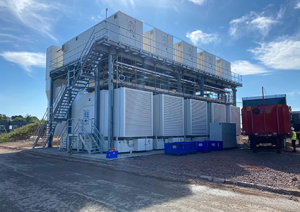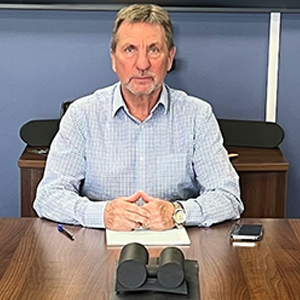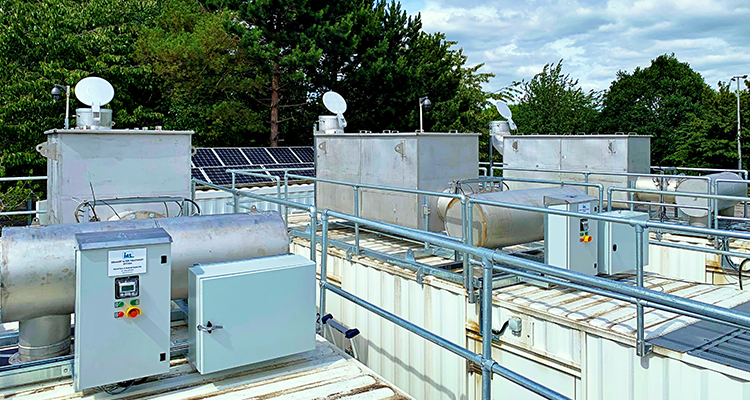Industrial and Marine Silencers is creating sustainable solutions to quieten industrial noise, and to help improve air quality
Industrial and Marine Silencers (IMS) is a global leader in “Noise Reduction” and “Emissions Abatement Technology,” providing solutions to a wide range of bespoke industrial applications. Founded in 1991, the company’s growth has seen it enter multiple new markets, and today, it offers a full range of emission control technology, silencers, acoustic enclosures, air inlet and extract attenuators, as well as a wide range of accessories.

As environmental legislation increasingly comes into force and the UK strives to achieve Net Zero, IMS is a crucial player in creating clean solutions that help businesses to adapt and comply to such regulations. Glyn Rennocks, Managing Director at IMS, joins Manufacturing Today to discuss the company’s growth, its position within the industry, and sustainable alternatives.
“I have overseen three different moves within the company, each time into larger premises,” begins Glyn. “When I first joined the company, we had a small, 9000-square-foot factory, but we quickly moved to a purpose-built facility, which was double the size of our former site. We were then on the same site as our sister company, Bradgate Containers, and we were both fighting for space, so they took over that entire site and we moved yet again in 2013. We modernized a 35,000-sqaure-foot facility to suit our production requirements, and we remain there today.”
The sound of silence
As a global market leader, IMS has its own team of experienced site engineers, which enables it to provide full, turnkey installations, from design through to commissioning, for a wide variety of clients. This process includes project management, site surveys, problem analysis, structural calculations, and foundation drawings. Having worked in a variety of countries and conditions, its team possesses the experience and expertise required to deliver excellent projects that comply with local planning and environmental regulations.
“The power generation industry is our main area of supply, where we take a sound engineering role by minimizing the noise and emissions output of power generation technology,” Glyn states. “So, we largely manufacture silencers for exhaust gas, air intake, air vents, and spark arrester silencers. However, we also produce acoustic equipment: acoustic housings, for example, as well as ventilations, attenuators, and acoustic doors for plant room installations.
Emissions reduction
“Although we’ve expanded our standard product ranges as we’ve grown, our focus over the last five-to-six years has been to grow our after-treatment services to help customers reduce emissions,” he continues. “Part of this is providing catalytic converter units such as DOCs (Diesel Oxidation Catalysts), which are similar to those found within the automotive industry in cars, buses, and trucks, which are responsible for removing carbon monoxide and hydrocarbons etc., as well as DPFs (Diesel Particulate Filters) for the reduction of soot/carbon particles present in the exhaust due to incomplete combustion of the diesel fuel.”
Glyn details: “The other aspect of this program is the provision of Selective Catalytic Reduction (SCR) technology for combustion engines, which comes complete with an electronic adblue dosing system targeted to remove the nitrous oxides (NOx) emitted by the engine into the environment.”
SCR technology is uniquely designed for each application and can be retrofitted to existing power generation equipment, which reduces NOx emissions by around 90-to-95 percent.
Clean and green
For large stationary power applications, SCR systems are required to be retrofitted to existing engines to meet the regulations outlined in the Medium Combustion Plant Directive (MCPD), which entered UK law in 2017, with the aim to regulate power generation emissions.

“To facilitate our Emissions Abatement System offerings, we have invested around £200,000 in a large bed, high-definition plasma machine, and we have designed, manufactured and installed SCRT systems (combined DOC/DPF & SCR technology) that has been independently tested and accredited to reduce all legislated emissions in-line with the latest Stage V regulations,” Glyn explains. “This testing was completed for the Non-Road Mobile Machinery (NRMM) Low Emission Zone (LEZ) in London, where all construction machinery and mobile power generation equipment between 37-to-560kW rating have to fitted with such technology in order to be able to operate within the LEZ.”
Additionally, IMS partnered with Aeolus Air Quality Consulting (AAQC) in 2021, which is an independent environmental consultancy specializing in the assessment of air quality, dust, and odor. This partnership widens the scope of accessible support services that IMS can offer its clients in the power generation sector; for example, by undertaking feasibility studies or air quality assessments.
“We aim to use our 30 years of experience within the industry to help reduce air pollution in the UK’s quest to Net Zero, ensuring businesses remain up-to-date and compliant when installing our products,” Glyn elaborates. “In other words, we offer acoustics and emissions solutions to help our clients make their engines and equipment as clean and green as they possibly can be.” To set a precedent, IMS is promoting sustainability initiatives across the company, such as converting its fleet from traditional vehicles to electric and hybrid ones.
Fit for the future
IMS has also recently expanded its customer base by supplying products to data centers. “Data centers protect all the relevant data, so this is a rapidly growing market for us, with our reliance on technology, mobile phones, and computers continually increasing,” Glyn explains. “As well as having mains power, these centers have many megawatts of backup power because they cannot afford complications. While our main customer base within data centers is still the power generation sector, we also work with industries like offshore, ships, rail, and road; anywhere that has noisy machinery that needs quietening.”
The company’s expansion to new markets and developments within existing ones, is sure to see IMS continue to flourish in the industry. Glyn proposes: “It’s difficult to predict what will happen next, especially after the last few years of unprecedented global events. I would like to see the company continue to grow at a controlled, steady rate and maintain our stable condition moving forward, so that we are a fit-for-purpose business prepared for the future, whatever it may bring.
